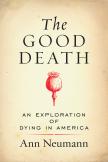Last Rights
As cancer ravaged her father’s once-strong body, Ann Neumann did her best to at least give him a “good death.” She hoped that he could exit life at home, surrounded by family, free of pain. She became his full-time caregiver in an effort to make it so. Then his pain grew so intractable that Neumann rushed him to a hospice facility. He twisted in agony until stronger drugs took hold, and then he died.
Neumann was left haunted by the belief that she had failed her father.
Eventually, as Neumann tells it, she sought peace by learning all she could about the experience of death in America. The Good Death explores how religious, legal and medical institutions dictate the death we get, even if that is not the death we want.
The Good Death does not match the power of two recent best-sellers on death and dying: Being Mortal, the surgeon Atul Gawande’s practical guide to making the most of whatever time one has; and Knocking on Heaven’s Door, Katy Butler’s heartbreaking tale of how her father’s mind gave way long before his body did. Both are better written and convey clearer, more practical messages.
The Good Death also takes a firmly secular approach that differs from Catholic teachings in key ways. It may help believers understand an alternative point of view, but only if they are willing to wade through disjointed interviews, quotations and research.
Neumann is no stranger to the topic of death. She is a visiting scholar at the Center for Religion and Media at New York University, one of 10 Centers of Excellence funded by The Pew Charitable Trusts to encourage research and teaching on religion. She writes a monthly column for the N.Y.U. center’s web journal The Revealer. Her work also has appeared in The New York Times, New York Law School Law Review and The Guardian, among other publications.
The Good Death covers a wide range of topics, some of which Neumann has explored in magazine and journal articles. She welcomes the spread of state laws that legalize assisted suicide; she deplores Catholic hospitals’ practice of denying care that conflicts with church beliefs.
She devotes a surprising amount of attention to death in prisons, whether by execution, self-starvation or the illnesses that plague the aging inmate population in the United States. It is an interesting topic but seems tangential to this book.
The book’s strongest chapter relates how Neumann worked out her grief after her dad’s death: by training as a hospice volunteer. We follow her as she helps broker better pain meds for Marshall, who hesitates to complain to the nurses as he wastes away in a Manhattan H.I.V. facility. She buys guitar strings for Mr. Cortez, whose 25-year struggle with Parkinson’s is nearing its end. She forms a deep friendship with Evelyn, an Upper West Side matron whose six-month hospice term stretches to years. (The author argues that these cases testify to hospice’s success; when allowed to remain home and pain-free, some patients defy doctors’ predictions for how much time they have left.)
Neumann devotes a chapter to assisted suicide, which Oregon, my home state, legalized in 1997. The Death with Dignity Act sets up a framework for terminally ill adult Oregonians to request a lethal dose of medication. As of February 2015, some 1,327 people had these prescriptions written. Of that number, 859 died from ingesting the medication; the rest died from other causes.
Washington State’s voters approved a similar law in 2008. The following year, Montana did so through the courts, and Neumann describes this last effort in detail.
The author frames the issue with personal interviews and quotes—even drawing on St. Thomas Aquinas, the renowned 13th century Catholic theologian. In her view, legalizing assisted suicide is a laudable step toward respecting patients’ privacy and autonomy. She laments that her 60-year-old father lacked this choice as he faced death in Pennsylvania.
Neumann also devotes considerable space to the ethics of tube feeding for unconscious patients who have no hope of recovery. She makes her case against the practice by recalling Terri Schiavo, the comatose Florida woman kept alive by a feeding tube for 15 years.
Schiavo’s husband sought to have the tube removed, saying that his wife would not have wanted to live this way. Her birth family fought to continue artificial feeding, citing Catholic teachings on euthanasia. After years of state and federal challenges, Schiavo’s husband prevailed; the tube was removed, and Schiavo died in March 2005.
In these and other chapters, the author creates a sort of collage through research, case histories and personal interviews. She does not state her case outright; she circles around it and lets her evidence build. The reader can be in the midst of a chapter before realizing: “She thinks assisted suicide is a good idea,” or “She thinks Catholic hospitals unfairly impose their beliefs on the public.”
Neumann briefly summarizes church teachings and even attends pro-life events in the course of her research. However, her descriptions come across as dismissive or condescending.
Catholic readers may wish to supplement this book with statements from the U.S. Conference of Catholic Bishops and with the thoughtful discussions in America and other publications.
Death is one experience that we share with all humanity. Yet we hesitate to tap the experiences of those who are dying. We shy from putting our own papers in order and from discussing our wishes with those who would carry them out.
It’s hard to think of a topic more deserving of thought and research. The Good Death, however, disappoints.
This article also appeared in print, under the headline “Last Rights,” in the February 15, 2016, issue.








